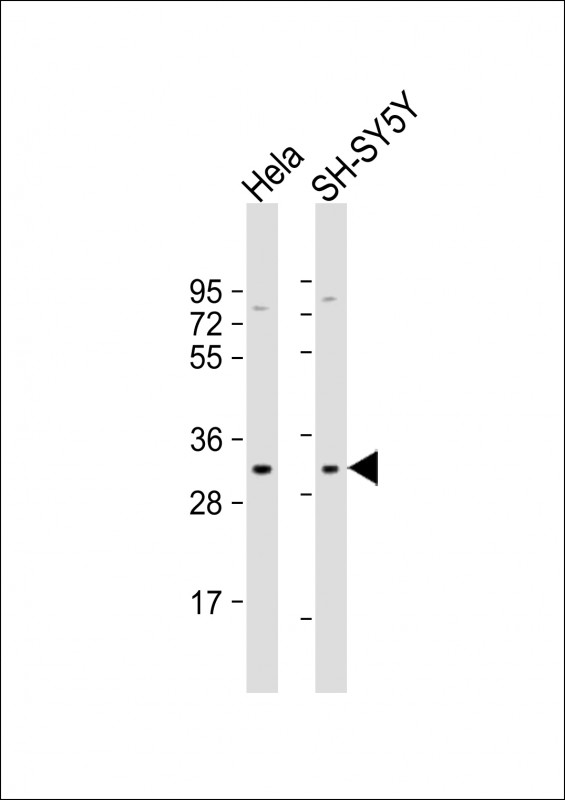
| WB | 1/1000 | Human,Mouse,Rat |
| IF | 咨询技术 | Human,Mouse,Rat |
| IHC | 咨询技术 | Human,Mouse,Rat |
| ICC | 技术咨询 | Human,Mouse,Rat |
| FCM | 咨询技术 | Human,Mouse,Rat |
| Elisa | 咨询技术 | Human,Mouse,Rat |
| Aliases | Gap junction beta-3 protein, Connexin-31, Cx31, GJB3, CX31 |
| Entrez GeneID | 2707 |
| WB Predicted band size | 30.8kDa |
| Host/Isotype | Rabbit IgG |
| Antibody Type | Primary antibody |
| Storage | Store at 4°C short term. Aliquot and store at -20°C long term. Avoid freeze/thaw cycles. |
| Species Reactivity | Human |
| Immunogen | This Connexin 31 Antibody antibody is generated from rabbits immunized with a KLH conjugated synthetic peptide between 204~233 amino acids from the C-terminal region of human GJB3. |
| Formulation | Purified antibody in PBS with 0.05% sodium azide. |
+ +
以下是关于Connexin 31(GJB3)抗体的3篇文献示例,包含文献名称、作者及摘要内容概括:
---
1. **文献名称**:*Mutations in the gene encoding gap junction protein beta-3 (GJB3) associated with autosomal dominant hearing impairment*
**作者**:Richard, G., et al.
**摘要**:该研究首次报道了GJB3基因突变与常染色体显性遗传性听力损失的关联。通过Western blot和免疫组化实验,使用Connexin 31特异性抗体检测突变蛋白在耳蜗组织中的异常表达,揭示了其在听觉功能中的作用。
---
2. **文献名称**:*Connexin 31 (GJB3) is expressed in the peripheral and auditory nerves and causes neuropathy and hearing impairment*
**作者**:Heathcote, K., et al.
**摘要**:研究通过免疫荧光染色结合Connexin 31抗体,发现其在周围神经和听觉神经中的表达,并证实GJB3突变导致神经传导异常和听力障碍,提示其在中枢与外周神经系统中的双重功能。
---
3. **文献名称**:*Altered trafficking and stability of Connexin 31 mutants associated with erythrokeratodermia*
**作者**:Lopez-Bigas, N., et al.
**摘要**:利用Connexin 31抗体进行细胞定位分析,发现红绀症相关突变体(如N54K)因蛋白错误折叠而在内质网滞留,导致细胞间连接功能缺陷,阐明了疾病发生的分子机制。
---
**注意**:以上文献信息为示例,实际引用时请通过PubMed或Google Scholar核对准确性。如需更近期研究,可检索关键词“Connexin 31 antibody”或“GJB3 immunohistochemistry”获取最新进展。
Connexin 31 (Cx31), encoded by the *GJB3* gene, is a member of the connexin protein family that forms gap junctions, facilitating direct intercellular communication. These channels enable the exchange of ions, metabolites, and signaling molecules, playing critical roles in tissue homeostasis and coordinated cellular activity. Cx31 is predominantly expressed in epithelial cells, the epidermis, and the inner ear, where it contributes to skin barrier function and auditory processes. Mutations in *GJB3* are linked to human disorders, including erythrokeratodermia variabilis (EKV), a skin condition characterized by hyperkeratosis and migratory erythema, and nonsyndromic hearing loss.
Antibodies targeting Cx31 are essential tools for studying its expression, localization, and function in physiological and pathological contexts. They are widely used in techniques like immunohistochemistry, Western blotting, and immunofluorescence to investigate Cx31 distribution in tissues, particularly in skin and cochlear samples. Research utilizing these antibodies has elucidated mechanisms underlying Cx31-related diseases, such as impaired gap junction assembly or abnormal protein trafficking caused by mutations. Additionally, Cx31 antibodies aid in exploring its interaction with other connexins (e.g., Cx30) in maintaining epidermal integrity or auditory function. These studies not only advance understanding of connexin biology but also inform therapeutic strategies targeting gap junction dysfunction. Commercial Cx31 antibodies are typically validated for specificity across species, though variability in performance may require optimization depending on experimental conditions.
×